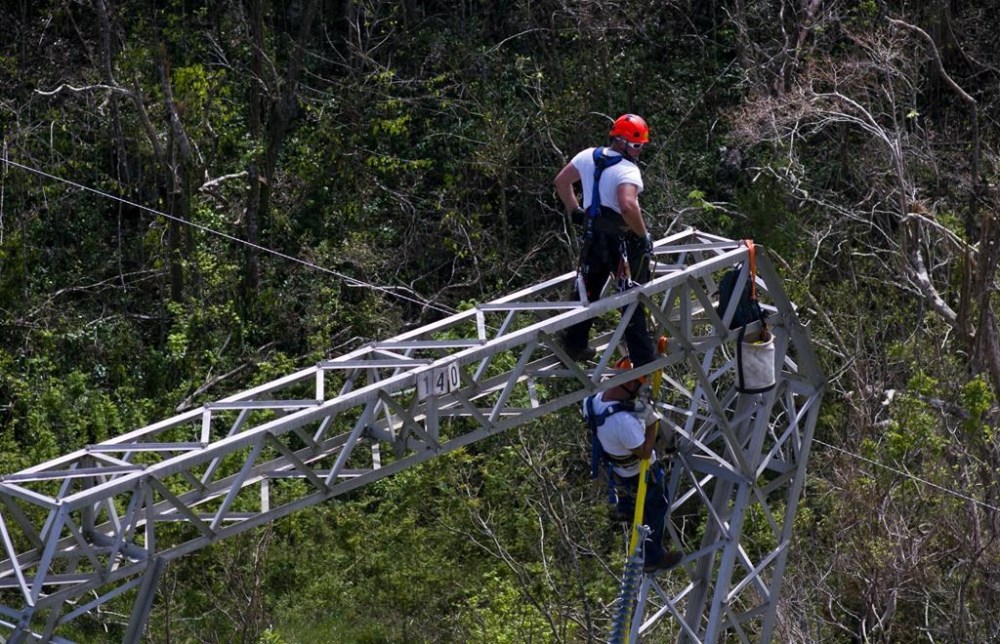Environmentalists sue Puerto Rican government over location of renewable energy projects
Advertisement
Read this article for free:
or
Already have an account? Log in here »
To continue reading, please subscribe:
Monthly Digital Subscription
$1 per week for 24 weeks*
- Enjoy unlimited reading on winnipegfreepress.com
- Read the E-Edition, our digital replica newspaper
- Access News Break, our award-winning app
- Play interactive puzzles
*Billed as $4.00 plus GST every four weeks. After 24 weeks, price increases to the regular rate of $19.00 plus GST every four weeks. Offer available to new and qualified returning subscribers only. Cancel any time.
Monthly Digital Subscription
$4.75/week*
- Enjoy unlimited reading on winnipegfreepress.com
- Read the E-Edition, our digital replica newspaper
- Access News Break, our award-winning app
- Play interactive puzzles
*Billed as $19 plus GST every four weeks. Cancel any time.
To continue reading, please subscribe:
Add Free Press access to your Brandon Sun subscription for only an additional
$1 for the first 4 weeks*
*Your next subscription payment will increase by $1.00 and you will be charged $16.99 plus GST for four weeks. After four weeks, your payment will increase to $23.99 plus GST every four weeks.
Read unlimited articles for free today:
or
Already have an account? Log in here »
Hey there, time traveller!
This article was published 14/08/2023 (785 days ago), so information in it may no longer be current.
SAN JUAN, Puerto Rico (AP) — Activists and environmental groups including the Sierra Club sued Puerto Rico’s government Monday over the planned location of dozens of renewable energy projects meant to ease the U.S. territory’s power woes.
The lawsuit claims the projects would be built on lands that are ecologically sensitive and of high agricultural value, a violation of local laws.
The groups requested that a judge prohibit various local government agencies from approving projects on such lands, noting that they should instead be built on roofs, parking lots, landfills in disuse and previously contaminated grounds.

“The loss of prime agricultural land to install solar projects of an industrial magnitude is a serious attack on the food security of Puerto Rico, which is already in precarious condition,” said David Sotomayor, a soils professor at the University of Puerto Rico.
Puerto Rico’s Energy Bureau has so far approved 18 projects on more than 2,000 hectares that the lawsuit states are classified as special agricultural reserve and specially protected rustic land.
A spokeswoman for the Energy Bureau did not return a message for comment.
Meanwhile, a spokeswoman for Puerto Rico’s Justice Department, which also was named in the lawsuit, said the agency had not received a copy of the lawsuit and has not been able to review it.
The groups suing also accused the Energy Bureau of withholding the names of the projects and other details because of alleged confidentiality, noting they had to go to court to obtain what is supposed to be public information.
The lawsuit comes as the government of Puerto Rico prepares to consider dozens of additional renewable energy projects in a push to lessen its dependence on oil. Petroleum accounts for nearly 60% of the island’s energy use, followed by natural gas at 28%, coal around 12% and renewables only 2%, according to the U.S. Energy Information Administration.
As a result, power bills in Puerto Rico are one of the highest of any U.S. jurisdiction.
Recent policies dictate that Puerto Rico must obtain 40% of its power supply from renewables by 2025 and 60% by 2040. The renewable energy projects are part of a push to rebuild the island’s power grid after Hurricane Maria razed it in September 2017, with ongoing power outages still plaguing the U.S. territory.
In the lawsuit, the groups asked a judge to order the Puerto Rico Energy Bureau to identify suitable places for industrial energy projects to be built, among other things.
“We favor renewable energy, but not to the detriment of land of high ecological value and agricultural reserves in the largest productive places,” said Marissa Reyes, from the Boricuá Organization for Eco-Organic Agriculture Inc.

